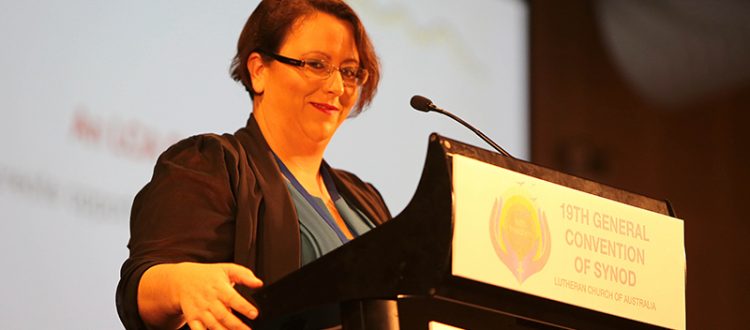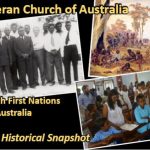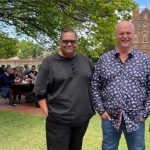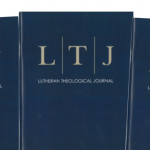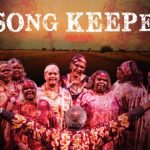‘I am many things to many people’
This is the text of Shona Reid’s speech to the LCA General Synod in October 2018 in which she put the case for the adoption of an LCA Reconciliation Action Plan (RAP).
I am many things to many people.
I am an Eastern Arrernte Woman. I am married to a Wangkungurru man. I am a mum to seven children. I am an Aboriginal Christian woman … I am also a person who is passionate about reconciliation and walking together.
I would like to pay my respects to the many who have gone before all of us who have honoured God by caring for this land in the ways they have lived and in the stories they have shared. For this, I would like to acknowledge and give thanks to the traditional custodians of the land we meet on today, the Gadigal people of the Eora Nation.
I would also like to acknowledge and pay my respects to the many of you who have dedicated your working and personal lives to building relationships with Aboriginal people and communities, to sharing God’s word and to working together with many Aboriginal people.
I am here today to seek your support for an LCA proposal to enable the church to build upon this very work.
Reconciliation is talked about a lot, but reconciliation can mean different things to different people. It’s what I like to term ‘Many Eyes’ …
I would like to show you a piece of artwork my son Henry has painted. We all know art speaks differently to different people … for me, ‘Many Eyes’ is about the:
- many views on what reconciliation is
- many people that have walked and journeyed before us
- many things that are yet to be done
- many people that are needed to get these things done.
But the best interpretation, I think, has come from the artist … Henry told me that:
It’s about how there is one God and there are lots of people … we are all different – that’s a good thing – because we can all see different parts of God and share that with each other … That way we can all learn from each other and love God at the same time.
I don’t think I could ever capture a more pure and beautiful definition of reconciliation if I tried … but what I am going to try and convey to you is the importance of this proposal: the development of a Reconciliation Action Plan (RAP) and the organisational support required to develop and implement it.
The reconciliation journey is hard. Even the most stoic have walked away from it in search of simple solutions or a ‘silver bullet’ that promises strong partnerships and better outcomes. We know there is no silver bullet. There never has been.
The most relevant and notable example was the synod in 2000, which showed the church’s desire to commit to a process of working towards reconciliation (resolution 51 (b)) but without the dedicated resources, without guidance and without clear national direction, the visions from 2000 Synod have only partly been realised.
I can see people out there and a few thought bubbles … Let me grab some of them:
Thought Bubble 1: What is a RAP? Is it just a piece of paper?
A RAP is much like a business plan or strategic plan, a RAP is a tool that our church will use, that can help us:
- listen more intently
- make a plan together
- publicly commit to this plan
- follow through and keep on track with this plan
- be accountable for what we do, and, what we don’t do.
It provides a list of agreed practical actions that drives our church’s contribution to reconciliation.
We have all seen our best intentions waiver off after a period of time … when we don’t plan, when we don’t commit resources, when we don’t keep track of our progress. This is what inevitably happens.
The RAP stops the drift. It promotes continued focus and momentum.
Thought Bubble 2: We have good runs on the board with Aboriginal communities; we are working well with communities … Why do we need this?
OR at the other end of the spectrum: We don’t have many Aboriginal people in our area … Why is this important for us?
Good questions … Yes, you are right – our church does have a strong and positive working relationship with a number of Aboriginal communities across Australia, but there are many more Aboriginal communities and families that have yet to connect with our church.
An LCA RAP allows us to:
- draw on our existing relationships, knowledge and resources
- provide greater support to our existing Aboriginal mission areas
- develop stronger respect for Aboriginal and Torres Strait Islander cultures
- create opportunities for us to work together and grow strong in faith.
I could talk for hours on this topic – I really could – but at its core, this proposal is about continuing to build upon our solid foundation of respectful and dignified relationships between the First Nations people and other Australians to enable us to come together and live reconciled in Christ.
The path to reconciliation is not a task that any one entity can undertake on its own. It is a joint movement of all people, places, races and identities.
For me, living in the church that has a RAP demonstrates visible evidence that our church, your church, intentionally cares about such matters. It cares enough about Aboriginal people to want be a part of our lives and cares enough about us to want to share in God’s love.
The river is the river and the sea is the sea. Salt water and fresh, two separate domains. Each has its own complex patterns, origins, stories. Even though they come together they will always exist in their own right. This is reconciliation.

